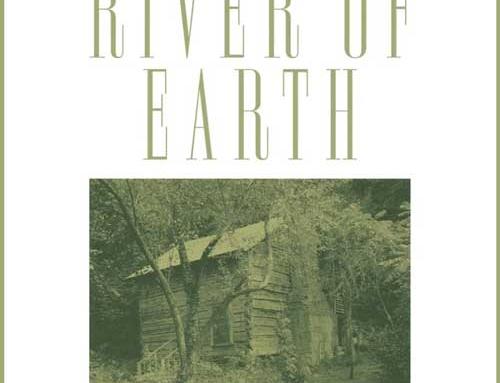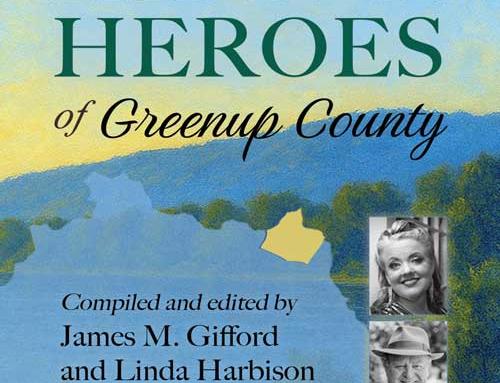JSF’s CEO & Senior Editor remains very much active in 50-year career
Dr. James M. Gifford, the CEO & Senior Editor of the Jesse Stuart Foundation, has an article on Donald Davidson’s mentorship of Jesse Stuart in the current issue of the Tennessee Historical Quarterly (THQ). One of the best historical journals in the United States, the THQ is published by the Tennessee Historical Society four times a year. This scholarly, illustrated journal features the finest articles, book reviews, and edited primary materials covering all aspects of Tennessee and southern history.

Nearing his 80th birthday, Jesse Stuart Foundation CEO & Senior Editor James M. Gifford remains an active scholar.
Dr. Gifford’s article is a continuation of his 50-year publishing career. During the 70s and 80s, he published in the Washington State University Research Journal, the Georgia Historical Quarterly, Louisiana Studies: An Interdisciplinary Journal of the South, Prologue: The Journal of the National Archives, the South Atlantic Quarterly, a nationally recognized literary journal published at Duke University, the Filson Club History Quarterly, and other state and regional publications. As a result of his research and writing in the field of Black history, Dr. Gifford was offered an editorial position on the Frederick Douglas Papers at Yale University in June 1978.
A country boy at heart, Gifford chose to remain in Appalachia. In the fall of 1978, he accepted a staff position with Morehead State University’s Appalachian Development Center. For the next seven years, Gifford turned his scholarly interests to Appalachian history and literature.
In 1985, he accepted the executive leadership of the Jesse Stuart Foundation, a position he has held with distinction for thirty-nine years. His wide range of publications in the field of Appalachian studies brought professional awards as an author, educator, editor, and publisher culminating in 2021 with the Milner Award, the most prestigious award given by the Kentucky Arts Council.
Dr. Gifford, who will suffer his eightieth birthday in July, remains an active scholar. He and the great James Still biographer Carol Boggess have spent the last four years compiling and editing a collection of essays on the depression decade in southeastern Kentucky. Dr. Gifford is also working with a Morehead State University historian, Dr. Benjamin Fitzpatrick, on a book that focuses on the Black experience in central Appalachia. In addition to every-other-week newspaper articles, Gifford is also completing a memoir.
Under Dr. Gifford’s leadership, the JSF has become a consortium of publishing excellence and regional service. He implements a wide range of community service activities: Regional Readers, a group of adults who meet each month to discuss a book that focuses on Kentucky or Appalachia; the annual Jesse Stuart Weekend; the Jesse Stuart Book Project, the distribution of a Stuart junior book to Kentucky sixth graders; public presentations; the Kentucky Book Fair; Stuart Dramas; and an ongoing intellectual relationship with the people of Kentucky and Appalachia. “They are our region’s most valuable resource,” proclaims Dr. Gifford.
JSF’s CEO & Senior Editor remains very much active in 50-year career
Dr. James M. Gifford, the CEO & Senior Editor of the Jesse Stuart Foundation, has an article on Donald Davidson’s mentorship of Jesse Stuart in the current issue of the Tennessee Historical Quarterly (THQ). One of the best historical journals in the United States, the THQ is published by the Tennessee Historical Society four times a year. This scholarly, illustrated journal features the finest articles, book reviews, and edited primary materials covering all aspects of Tennessee and southern history.
Dr. Gifford’s article is a continuation of his 50-year publishing career. During the 70s and 80s, he published in the Washington State University Research Journal, the Georgia Historical Quarterly, Louisiana Studies: An Interdisciplinary Journal of the South, Prologue: The Journal of the National Archives, the South Atlantic Quarterly, a nationally recognized literary journal published at Duke University, the Filson Club History Quarterly, and other state and regional publications. As a result of his research and writing in the field of Black history, Dr. Gifford was offered an editorial position on the Frederick Douglas Papers at Yale University in June 1978.

Nearing his 80th birthday, Jesse Stuart Foundation CEO & Senior Editor James M. Gifford remains an active scholar.
A country boy at heart, Gifford chose to remain in Appalachia. In the fall of 1978, he accepted a staff position with Morehead State University’s Appalachian Development Center. For the next seven years, Gifford turned his scholarly interests to Appalachian history and literature.
In 1985, he accepted the executive leadership of the Jesse Stuart Foundation, a position he has held with distinction for thirty-nine years. His wide range of publications in the field of Appalachian studies brought professional awards as an author, educator, editor, and publisher culminating in 2021 with the Milner Award, the most prestigious award given by the Kentucky Arts Council.
Dr. Gifford, who will suffer his eightieth birthday in July, remains an active scholar. He and the great James Still biographer Carol Boggess have spent the last four years compiling and editing a collection of essays on the depression decade in southeastern Kentucky. Dr. Gifford is also working with a Morehead State University historian, Dr. Benjamin Fitzpatrick, on a book that focuses on the Black experience in central Appalachia. In addition to every-other-week newspaper articles, Gifford is also completing a memoir.
Under Dr. Gifford’s leadership, the JSF has become a consortium of publishing excellence and regional service. He implements a wide range of community service activities: Regional Readers, a group of adults who meet each month to discuss a book that focuses on Kentucky or Appalachia; the annual Jesse Stuart Weekend; the Jesse Stuart Book Project, the distribution of a Stuart junior book to Kentucky sixth graders; public presentations; the Kentucky Book Fair; Stuart Dramas; and an ongoing intellectual relationship with the people of Kentucky and Appalachia. “They are our region’s most valuable resource,” proclaims Dr. Gifford.




